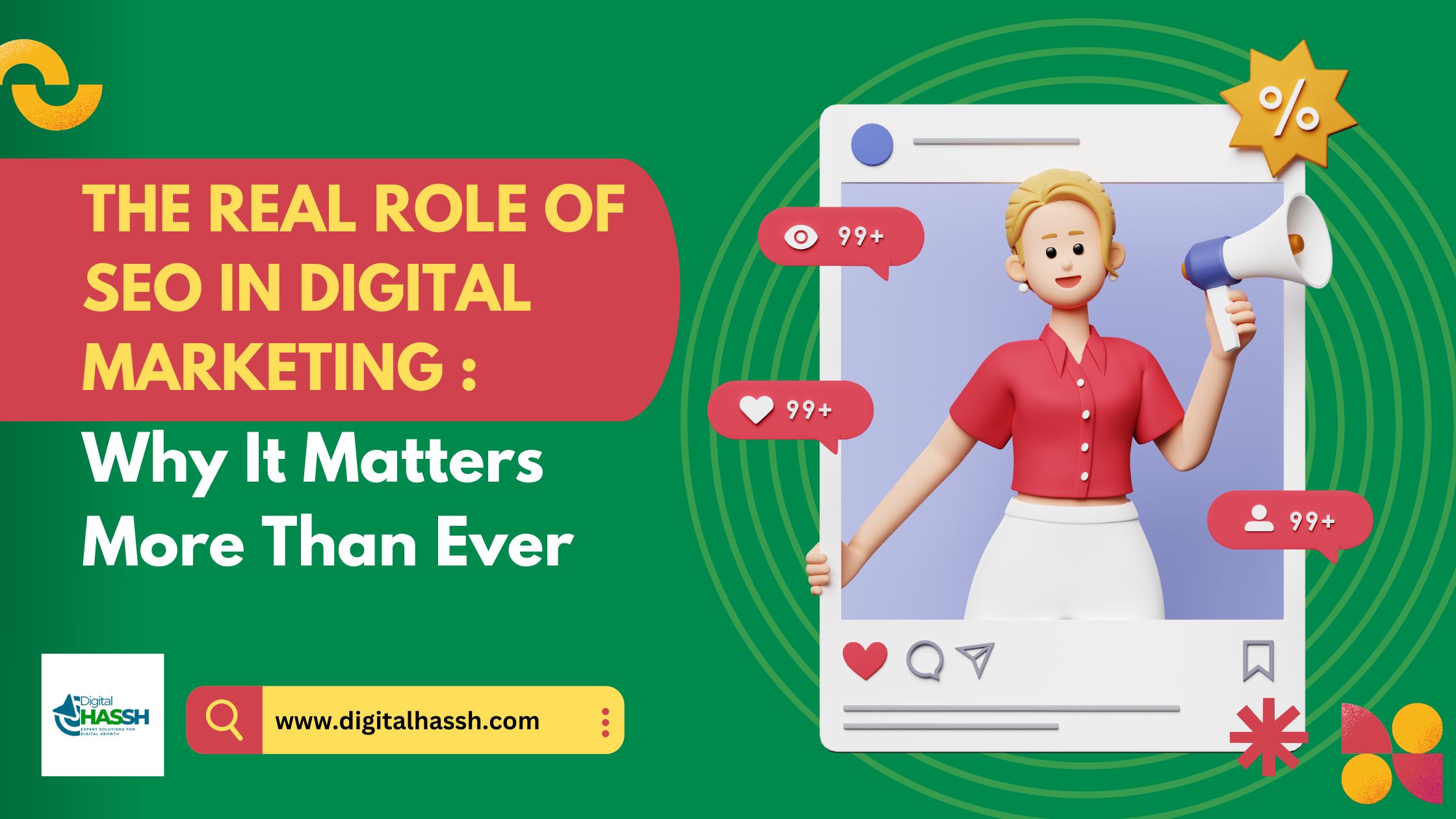
In a world where every business is trying to gain online visibility, mastering SEO in digital marketing has become not just relevant—but essential. Whether you’re a startup founder, a digital marketing manager, or a freelancer learning the ropes, understanding SEO’s evolving role in today’s digital landscape is a game changer.
This blog dives deep into how Search Engine Optimization connects with every piece of digital strategy and why it remains the backbone of long-term digital success.
Understanding What is Digital Marketing in 2025 Context
Digital marketing in 2025 is no longer just about running Facebook ads or sending weekly newsletters. It’s about building a connected brand experience across multiple digital channels.
With voice assistants, AI-powered search, zero-click results, and hyper-personalized content dominating the landscape, brands must create a strategy that earns attention—not demands it. This means showing up in the right place, at the right time, with the right message. And this is exactly where SEO plays a critical role.
Breaking Down What is SEO Marketing and SEO Content
Before jumping to technicalities, let’s simplify the jargon.
What is SEO marketing?
It’s the process of optimizing your website and content to make it easily discoverable by search engines like Google, Bing, and others. The goal is to rank higher organically—without paid ads.
What is SEO content?
It refers to blog posts, landing pages, product descriptions, and even video transcripts that are written and structured to satisfy both search engines and user intent.
When done right, SEO marketing brings sustained traffic, improves visibility, and attracts relevant users over time—organically and affordably.
Core Objectives of SEO in a Digital Strategy
The objectives of SEO align beautifully with broader digital marketing goals. These include:
- Visibility: Appearing on the first page of search engines.
- Credibility: Organic rankings build trust.
- Traffic: Driving potential customers to your digital assets.
- Conversion: Supporting landing pages and sales funnels.
- Brand Awareness: Staying top-of-mind with consistent SERP presence.
Unlike paid ads, SEO results take time—but once they kick in, they’re longer-lasting and cost-effective.
How SEO Helps in Digital Marketing for Long-Term Growth
SEO doesn’t deliver overnight miracles—but that’s the point. It compounds over time.
Here’s how SEO helps in digital marketing:
- Content discovered organically builds long-term audience engagement.
- On-page optimization ensures your site structure is search-friendly.
- Backlink strategies improve domain authority and online reputation.
- Local SEO helps small businesses dominate their immediate market.
- User experience (UX) is enhanced when websites are optimized for speed, mobile, and navigation—all part of technical SEO.
When you invest in SEO, you’re investing in the future visibility of your brand. You create a system that attracts, educates, and converts customers at every funnel stage.
SEO Role in Digital Marketing Beyond Just Rankings
Often misunderstood as just “ranking #1 on Google,” the SEO role in digital marketing is much broader:
- It guides content creation so that it aligns with what people are searching for.
- It supports paid media campaigns by improving Quality Scores in Google Ads.
- It works closely with social media by ensuring links shared are optimized.
- It influences email marketing through data-backed content personalization.
SEO shapes your entire digital ecosystem. From technical audits to meta tags, from keyword research to user journey mapping—it’s all connected.
Best Practices to Align SEO with Your Overall Marketing Funnel
To integrate SEO seamlessly within your marketing strategy, follow these key practices:
- Map keywords to intent: Use high-intent keywords at conversion stages, and informational ones at the top of the funnel.
- Repurpose SEO content: Turn blog posts into videos, infographics, or email newsletters.
- Use SEO to inform content calendar: Let search trends guide what content you produce.
- Align with buyer personas: Optimize content around real user questions and pain points.
- Collaborate across teams: SEO experts should work with content writers, designers, and ad specialists.
When SEO works in sync with your funnel, each touchpoint becomes more effective.
Why SEO is Important in Digital Marketing
The real reason why SEO is important in digital marketing boils down to this: your audience is actively searching, and if you’re not showing up, someone else is.
Here’s why it truly matters in 2025:
- Users trust organic search more than ads.
- Search engines are gatekeepers of digital traffic.
- SEO gives compounding ROI—delivering returns long after the content is published.
- It builds authority, not just awareness.
- It supports every other marketing effort, from PPC to PR.
In a noisy online world, SEO in digital marketing ensures you’re not just seen—but seen by the right people, at the right time.
Ready to Boost Your Digital Growth with SEO?
Understanding the role of SEO in digital marketing is just the beginning. To stand out in 2025, you need a data-driven strategy tailored to your business goals. That means going beyond surface-level tactics and investing in SEO that works—from technical audits to content marketing and local search.
At Digital HASSH, we help brands like yours turn search visibility into measurable growth.
👉 Let’s connect and create an SEO strategy that powers your entire digital marketing funnel.
📩 Book your free consultation today.
FAQs
Q1. What is SEO in digital marketing?
SEO in digital marketing is the practice of optimizing your website and content so they appear higher in organic (non-paid) search results, ultimately driving traffic and leads.
Q2. Is SEO enough for online growth?
While SEO is essential, it’s most effective when integrated with other digital marketing channels like paid ads, social media, email, and content marketing.
Q3. How long does SEO take to show results?
Typically, you may start seeing noticeable results in 3–6 months. However, this depends on your competition, site history, and strategy consistency.
Q4. Can content marketing work without SEO?
Technically yes, but SEO ensures your content reaches the right audience. Without SEO, even high-quality content may remain undiscovered.
